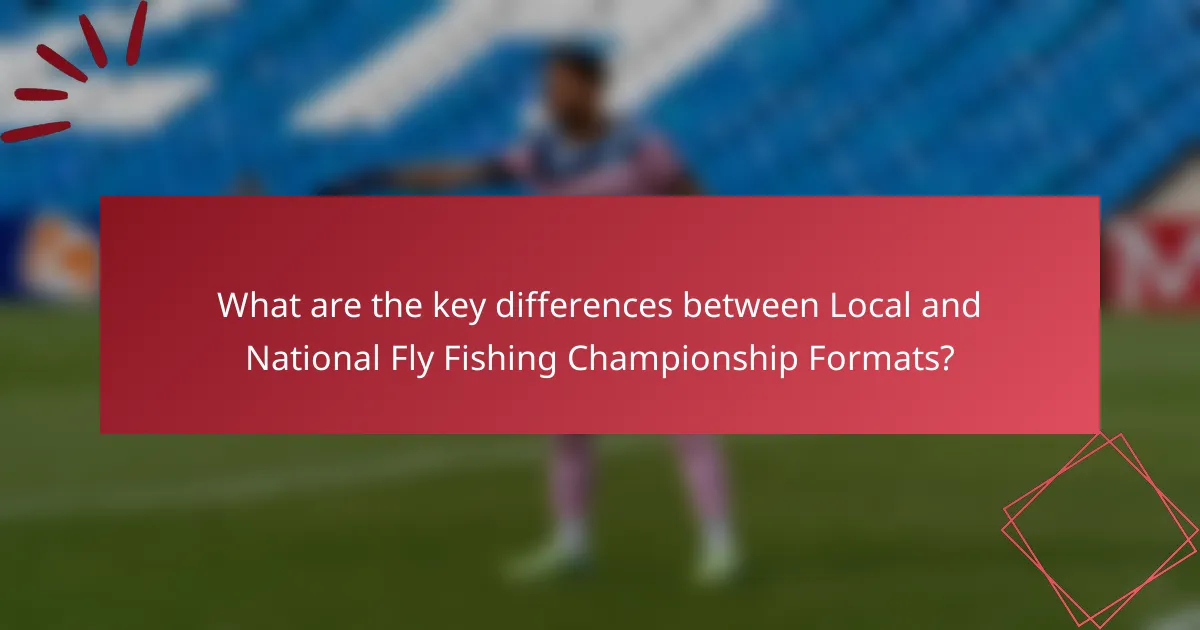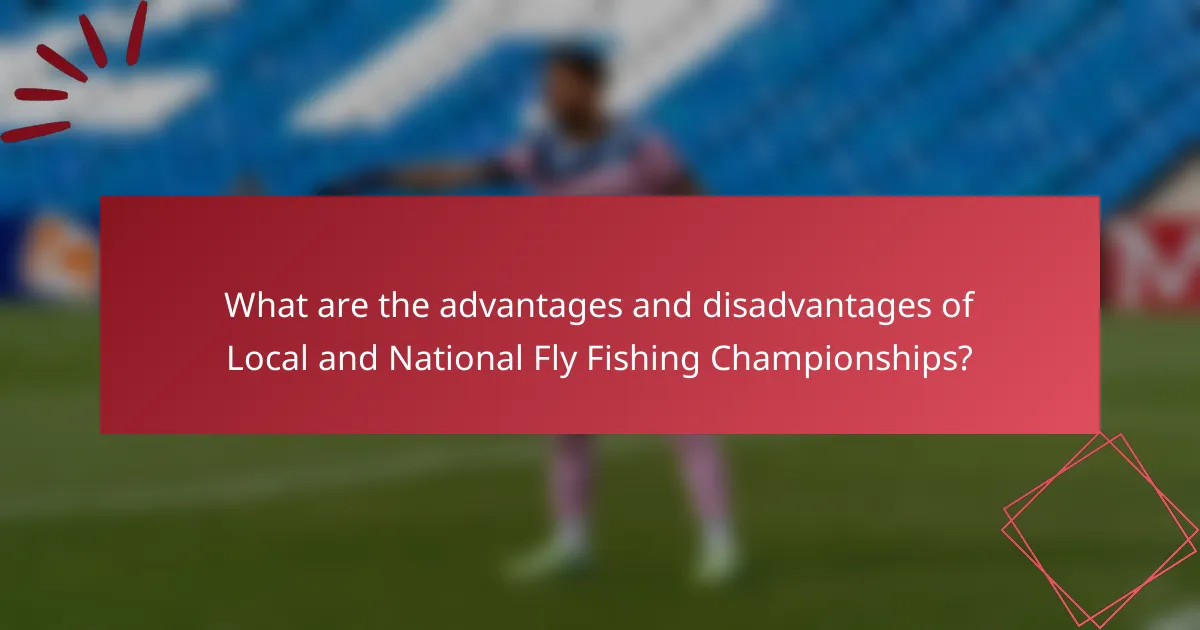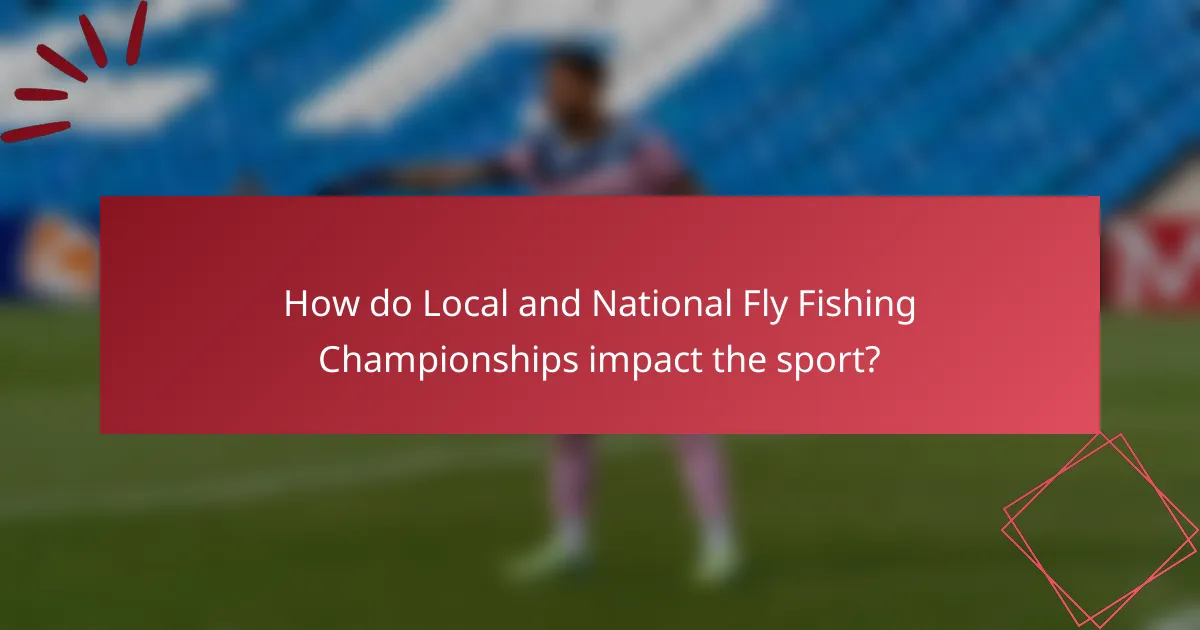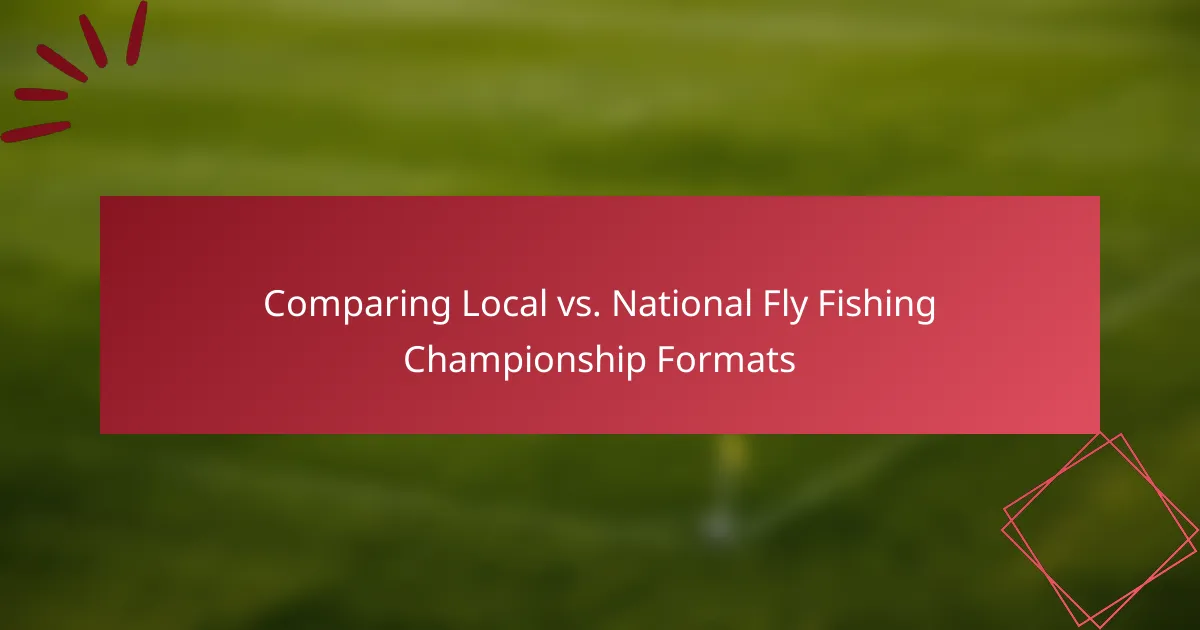The article compares Local and National Fly Fishing Championship formats, highlighting their differences in scale, organization, and participant engagement. Local championships focus on regional competitors, fostering community involvement and offering a more intimate competition atmosphere, while National championships attract a broader range of participants, featuring standardized rules and larger prize pools. The discussion includes the impact of these events on local economies, skill development, and community support, emphasizing how both formats contribute to the evolution of the sport. Key distinctions such as entry fees, competition levels, and sponsorship opportunities are also explored to provide a comprehensive understanding of each championship type.

What are the key differences between Local and National Fly Fishing Championship Formats?
Local and National Fly Fishing Championship Formats differ primarily in scale and organization. Local championships typically involve regional participants and are held in specific locations. They often focus on community engagement and fostering local talent. In contrast, National championships attract competitors from across the country. They are usually more structured and may have standardized rules and regulations.
Local events often have fewer participants, which can lead to a more intimate competition atmosphere. National events usually feature a larger pool of competitors, increasing the level of competition. Local formats may offer varied fishing techniques and species based on the region. National formats often standardize these aspects to ensure fairness and consistency.
Additionally, Local championships may have simpler prize structures, often emphasizing community recognition. National championships typically offer larger prizes and sponsorship opportunities. These differences highlight the distinct purposes and experiences of Local versus National Fly Fishing Championships.
How do the competition rules differ in Local vs. National formats?
Local and National fly fishing competition rules differ primarily in scope and regulations. Local competitions often have simplified rules tailored to the regional context. These rules may focus on specific species, local water bodies, and shorter time frames. In contrast, National competitions typically have standardized rules that apply across various regions. National rules often include more comprehensive regulations regarding species, catch limits, and fishing methods. Additionally, National formats may require participants to adhere to stricter qualifications and eligibility criteria. This ensures uniformity and fairness across all participants. Local events may allow more flexibility in judging and scoring methods. National events usually have established judging criteria and officiating standards to maintain consistency.
What specific regulations govern Local Fly Fishing Championships?
Local Fly Fishing Championships are governed by specific regulations set by the organizing bodies. These regulations typically include rules on fishing methods, allowable gear, and catch-and-release practices. Additionally, local championships may require participants to adhere to state fishing laws. Each championship may also establish its own rules regarding competition formats and time limits. For instance, some may have specific zones where fishing is permitted. Compliance with these regulations ensures fair competition and conservation of aquatic ecosystems. Local organizations often publish these regulations in advance to inform participants.
What unique rules apply to National Fly Fishing Championships?
National Fly Fishing Championships have specific rules that differ from local competitions. One unique rule is the use of catch-and-release practices. Competitors must ensure that all fish caught are returned to the water unharmed. Another rule involves the specific types of flies that can be used. Only artificial flies that meet certain criteria are permitted. Additionally, there are strict regulations regarding the size and number of fish that can be caught during the competition. Participants are often required to adhere to designated fishing zones to ensure fair competition. Furthermore, the championships may implement time limits for each fishing session. These rules are established to maintain the integrity of the sport and promote sustainable fishing practices.
What are the participation requirements for Local and National Championships?
Participation requirements for Local and National Championships vary. Local championships typically require participants to be residents of the hosting area. They may also necessitate prior registration and adherence to specific local rules. National championships usually require participants to qualify through local competitions or meet specific eligibility criteria set by the governing body. Proof of skill level or prior competition results may be necessary. Additionally, participants must often comply with national regulations regarding equipment and conduct. These requirements ensure a fair and competitive environment for all entrants.
Who can compete in Local Fly Fishing Championships?
Anyone can compete in Local Fly Fishing Championships, provided they meet specific eligibility criteria. Typically, these criteria include age restrictions, residency requirements, and registration procedures. Participants often need to be local residents or members of affiliated fishing clubs. Some championships may also require participants to possess a valid fishing license. Additionally, competitors might need to register in advance and pay an entry fee. Local championships are generally open to both amateur and experienced anglers. This inclusivity encourages community engagement and promotes the sport among diverse groups.
What are the eligibility criteria for National Fly Fishing Championships?
The eligibility criteria for National Fly Fishing Championships typically include age, residency, and membership requirements. Participants must usually be of a certain age, often 18 or older. Residency in the hosting country or region is often required. Additionally, competitors may need to be members of a recognized fly fishing association. These criteria ensure fair competition and adherence to local regulations. Specific requirements can vary by year and organizing body, so it’s essential to consult the official championship rules for the most accurate information.
How do the scoring systems vary between Local and National formats?
Local and National fly fishing championship formats have distinct scoring systems. Local formats often use a points-based system, where anglers earn points based on the size and quantity of fish caught. National formats typically employ a more standardized scoring method, often focusing on the length of fish rather than weight.
In local competitions, points may be awarded for each fish caught, with bonuses for larger species. Conversely, national events may require measuring fish and awarding points based on total length. This reflects a broader consistency in national competitions to ensure fair comparisons across different regions.
Evidence of these differences can be found in the rules published by local fishing clubs versus national governing bodies. Local clubs may have flexibility in their scoring criteria, while national organizations like the International Game Fish Association adhere to standardized rules for all participants. This ensures that national scores are comparable and reflect a unified approach to scoring.
What scoring methods are commonly used in Local Championships?
Common scoring methods used in Local Championships include points-based systems and catch-and-release metrics. Points-based systems assign scores based on the size and species of fish caught. For example, larger fish typically yield more points. Catch-and-release metrics focus on the number of fish released back into the water, promoting conservation. These methods encourage ethical fishing practices while allowing for competition. Local championships often adapt these scoring methods to suit specific regional regulations and fish populations. Thus, they maintain fairness and relevance to the local environment.
How is scoring typically structured in National Championships?
Scoring in National Championships is typically structured based on the total weight of fish caught. Each fish is measured and weighed during the competition. Points are awarded according to the weight of each fish. The angler with the highest total weight at the end of the competition wins. Some championships may also include bonus points for specific species or sizes. This scoring method encourages anglers to target larger fish. It also promotes strategic fishing practices throughout the event. National Championships often follow standardized rules set by governing bodies to ensure fairness.

What are the advantages and disadvantages of Local and National Fly Fishing Championships?
Local fly fishing championships offer community engagement and accessibility. They allow local anglers to compete in familiar waters. This fosters camaraderie among participants. Local events often have lower entry fees. They can also attract local sponsors, boosting community support. However, local championships may lack exposure and prestige. They typically have smaller prize pools compared to national events.
National fly fishing championships provide wider recognition and higher stakes. They attract top talent from various regions. This elevates the competitive standard and experience. National events also offer larger prize pools and sponsorship opportunities. However, they can be more expensive to enter and require travel. Participants may face stiff competition, which can be intimidating. Additionally, the scale of national events can lead to less personal interaction among competitors.
What benefits do participants gain from competing in Local Championships?
Participants gain several benefits from competing in Local Championships. These events provide opportunities for skill development in a familiar environment. Local competitions often feature accessible locations that encourage community participation. Participants can gain recognition within their local fishing community. Competing at this level helps build confidence and experience for future competitions. Local Championships also foster camaraderie among anglers, enhancing social connections. Additionally, these events can showcase local fishing conditions and techniques. Overall, local competitions serve as a stepping stone to larger national events.
How does competing locally enhance community engagement?
Competing locally enhances community engagement by fostering connections among participants and residents. Local competitions create opportunities for interaction and collaboration. They encourage local businesses to participate, strengthening economic ties. This involvement promotes a sense of pride in the community. Additionally, local events often attract spectators, increasing community visibility. Studies indicate that local events can boost community cohesion by up to 30%. Engaging with local organizations further amplifies the impact of these competitions. Overall, local competitions serve as a catalyst for building relationships and enhancing community spirit.
What skills can be developed through Local competitions?
Local competitions can help develop various skills. Participants can enhance their fishing techniques through hands-on experience. They often learn to adapt to different water conditions and fish behaviors. Local competitions also foster teamwork and communication skills when working with partners. Competitors can improve their problem-solving abilities by strategizing during the event. Additionally, participants gain time management skills by preparing and executing their plans effectively. Finally, local competitions build confidence as anglers showcase their skills in a competitive environment.
What are the advantages of participating in National Championships?
Participating in National Championships offers several advantages. Athletes gain exposure to a higher level of competition. This experience enhances skills and techniques through challenging encounters. National Championships often attract top talent from across the country. Competing against elite opponents fosters personal growth and resilience. Additionally, participants can earn recognition and accolades on a national stage. This visibility can lead to sponsorship opportunities and career advancements. National Championships also provide networking opportunities with industry professionals. Engaging with a broader community can lead to lasting connections and collaborations.
How do National Championships provide exposure to larger audiences?
National Championships provide exposure to larger audiences through extensive media coverage. Televised events reach millions of viewers, showcasing the competition. Additionally, online streaming platforms expand accessibility beyond geographical limits. Social media engagement amplifies visibility and interaction with fans. Sponsorships from major brands increase promotional efforts. These championships attract participants from various regions, enhancing diversity and interest. The culmination of these factors elevates the event’s profile significantly.
What networking opportunities arise from competing at the National level?
Competing at the National level offers significant networking opportunities. Participants can connect with industry leaders and professionals. This includes sponsors, manufacturers, and experts in fly fishing. National events attract a diverse group of competitors and enthusiasts. These interactions can lead to collaborations and partnerships. Networking can also result in mentorship opportunities. Competitors can gain insights and advice from experienced anglers. Additionally, national competitions often have media coverage, enhancing visibility and connections. These relationships can be beneficial for career growth and personal development in the sport.
What challenges do participants face in Local vs. National formats?
Participants face different challenges in Local and National formats of fly fishing championships. Local formats often have limited resources and fewer participants. This can lead to less competitive environments and fewer opportunities for skill development. National formats, however, present a higher level of competition. Participants must adapt to diverse fishing conditions and regulations across states. The pressure to perform at a national level can be intense. Additionally, travel logistics and expenses can be significant challenges in national competitions. Participants may also face stricter rules and higher expectations from sponsors and the fishing community.
What logistical issues are common in Local Championships?
Common logistical issues in Local Championships include venue availability and accessibility. Organizers often face challenges in securing suitable locations. Weather conditions can also impact event scheduling and participation. Limited resources for equipment and staffing can hinder operations. Communication difficulties among participants and organizers may arise. Additionally, transportation logistics for competitors and equipment can be complex. Budget constraints often restrict the scope of the championship. These factors can lead to delays and reduced participant satisfaction.
What difficulties might arise for competitors in National Championships?
Competitors in National Championships may face several difficulties. These include higher levels of competition, which can increase pressure and stress. The larger scale of the event may lead to logistical challenges, such as travel and accommodation arrangements. Additionally, unfamiliar fishing environments can create adaptability issues for competitors. The stricter regulations at national levels may also pose challenges in terms of compliance. Weather conditions can be less predictable, affecting fishing strategies. Lastly, the need for advanced skills and techniques can be a barrier for some competitors. These factors collectively contribute to a more complex competitive landscape compared to local championships.

How do Local and National Fly Fishing Championships impact the sport?
Local and National Fly Fishing Championships significantly impact the sport by promoting participation and enhancing skills. These events create opportunities for anglers to compete at various skill levels. They encourage community engagement and foster local fishing cultures. National championships elevate the profile of the sport, attracting media attention and sponsorships. Increased visibility can lead to higher participation rates in local events. Data shows that regions hosting championships often see a boost in tourism and local economies. Additionally, these competitions provide a platform for anglers to share techniques and innovations, driving the sport’s evolution. Thus, both local and national events play crucial roles in shaping the future of fly fishing.
What role do Local Championships play in promoting fly fishing?
Local Championships play a significant role in promoting fly fishing by fostering community engagement and participation. They provide a platform for local anglers to showcase their skills and connect with fellow enthusiasts. These events often attract spectators, raising awareness about the sport within the community. Local Championships can also stimulate interest in conservation efforts, as participants often learn about sustainable fishing practices. Additionally, they serve as a gateway for newcomers to experience fly fishing in a supportive environment. The presence of local businesses, such as tackle shops and guides, further enhances the local economy. Overall, Local Championships contribute to the growth and popularity of fly fishing at the grassroots level.
How do Local events contribute to skill development in the sport?
Local events enhance skill development in the sport by providing hands-on experience and competition. Participants engage in real-time challenges that simulate actual fishing conditions. These events allow anglers to practice techniques in varied environments. Local competitions often feature diverse skill levels, promoting learning through observation and interaction. Feedback from peers and judges helps identify areas for improvement. Research shows that frequent participation in local events leads to increased confidence and proficiency. A study by the American Sport Education Program highlights that competition fosters skill acquisition and retention in sports. Thus, local events are crucial for developing practical skills in fly fishing.
What community benefits arise from hosting Local Championships?
Hosting Local Championships fosters community engagement and unity. These events bring together local residents, promoting social interaction. They provide opportunities for local businesses to thrive through increased foot traffic. Local Championships also encourage youth participation in sports, fostering teamwork and discipline. Additionally, they can enhance community pride and identity. Research shows that local sporting events boost local economies by an estimated 10-20%. This economic impact supports jobs and local services. Overall, Local Championships create a sense of belonging and community spirit.
How do National Championships influence the fly fishing industry?
National Championships significantly influence the fly fishing industry by elevating competition standards and promoting participation. These events attract skilled anglers, showcasing advanced techniques and innovations. Increased visibility from national events drives interest in fly fishing among the general public. This heightened interest leads to greater sales of fishing gear and related products. Additionally, national championships often attract sponsorships, benefiting local economies and businesses. For instance, the 2023 National Fly Fishing Championships generated over $1 million in local revenue. Such events also foster community among anglers, encouraging knowledge sharing and skill development. Overall, national championships play a crucial role in shaping the industry’s growth and sustainability.
What trends in fly fishing are driven by National competition results?
National competition results drive trends in fly fishing by influencing techniques, gear selection, and competitive strategies. Increased focus on precision casting has emerged as competitors aim to excel in accuracy-based events. The popularity of specific fly patterns has surged, with winners often showcasing effective, innovative designs. Additionally, advancements in rod and reel technology are evident, as competitors seek lighter, more responsive equipment. The competitive environment fosters collaboration among anglers, leading to shared knowledge and improved practices. This exchange has resulted in a greater emphasis on sustainable fishing practices, reflecting a shift towards environmental responsibility in the sport.
How do National Championships shape the future of the sport?
National Championships shape the future of the sport by establishing competitive standards and fostering talent development. These events attract top athletes, creating benchmarks for skill and performance. They also enhance visibility, drawing media attention and sponsorship, which increases funding for the sport. Participation in National Championships often leads to greater opportunities for athletes, including pathways to international competitions. Historical data shows that sports with strong national championship structures, like basketball and soccer, experience increased youth participation rates. This trend indicates that successful national events inspire grassroots movements and community engagement. Furthermore, national championships can influence rule changes and innovations in techniques, driving the sport’s evolution.
What tips can help competitors succeed in both Local and National formats?
Competitors can succeed in both Local and National formats by adapting their strategies to each environment. Understanding local regulations and conditions is crucial for local competitions. National formats often require knowledge of broader rules and diverse fishing environments. Competitors should practice in different settings to gain versatility. Building a network with local anglers can provide valuable insights. In national competitions, leveraging online resources for tips and tactics is beneficial. Analyzing past competition results helps identify successful strategies. Finally, maintaining physical fitness and mental focus is essential for performance in both formats.
The main entity of this article is the comparison between Local and National Fly Fishing Championship Formats. The article outlines the key differences in scale, organization, competition rules, participation requirements, and scoring systems for both formats. It highlights how Local Championships focus on community engagement and accessibility, while National Championships emphasize standardized regulations and higher stakes competition. Additionally, the article discusses the advantages and disadvantages of each format, the impact on skill development, and the broader implications for the sport of fly fishing.
